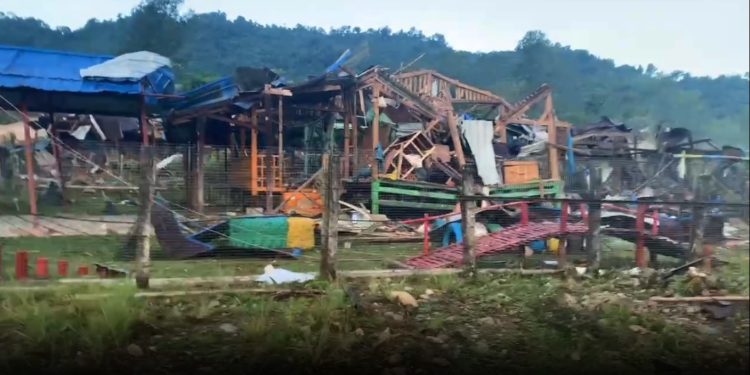The Kachin Women’s Association Thailand is demanding that China halt its plan to accelerate its infrastructure investment in Myanmar through its Belt and Road Initiative (BRI), saying Beijing “will find itself complicit in the mounting atrocities associated with the planned projects.”
The association’s recently released report—“Bloodstained Gateways: escalating SAC abuses in northern Burma pave the way for BRI expansion”— says that China’s BRI projects are “fueling conflict and abuses” and that Beijing is “taking huge risk to push ahead with [the] BRI in partnership with [the] Myanmar regime.”
“SAC” is an acronym for the State Administration Council (SAC), the name the junta chose for itself after its 2021 coup.
The report details an escalation of conflict and human rights abuses in Kachin and northern Shan states since mid-2022 and says they are happening to “pave the way for BRI expansion.” Rights abuses detailed in the report include air and artillery attacks on civilians, mass torching of villages, using civilians as human shields and gang rape.
“While Myanmar is engulfed by civil war, increased investment in an area with poor human rights records can further escalate the fighting. It facilitates human rights violations, and we are demanding that China stop its BRI investment while these [human rights violations] are happening,” association spokeswoman Ja Ing said.
“There are no guarantees of security, and China will find itself complicit in the mounting atrocities associated with the planned projects,” she added.
The BRI is an ambitious plan to develop maritime and overland trade routes connecting China with about 150 countries in Asia, Eurasia, the Middle East and Africa.
China has been implementing the China-Myanmar Economic Corridor (CMEC) as part of its BRI. The CMEC comprises a seaport and special economic zone in Kyaukphyu Township in western Myanmar’s Rakhine State, a railway linking Kyaukphyu with China’s Kunming in landlocked Yunnan Province, and cross-border economic cooperation zones in Shan and Kachin states.
Some of the projects are in combat zones where the junta’s military is fighting local ethnic armed groups, including the Kachin Independence Army (KIA).
The report details 30 incidents of shelling by junta troops in civilian areas since mid-2022 in Kachin and northern Shan states, which killed 61 civilians and wounded nearly 200 more.
“With conventional warfare failing against resistance forces, the regime is increasingly resorting to attacks against civilians,” Ja Ing said.
The attacks and abuses have displaced nearly 14,000 village residents during the past 15 months, even as the regime has been pushing ahead with plans to shut existing camps for internally displaced persons (IDPs) in northern Myanmar that shelter over 107,000 people.
On Monday night, hours after the report was released, at least 29 people, including children, were killed and dozens more wounded in a junta attack on a camp for IDPs near the KIA headquarters of Laiza in Kachin State.
“China shares the longest land border with Myanmar. If they want to improve ties between the two countries for increased border security, they should stop the [BRI] project,” Ja Ing said.
“These projects should be canceled, and no new investments considered until the military regime is removed and elections held under a new federal democratic constitution, guaranteeing free, prior and informed consent of local communities to any new projects,” a press release accompanying the report said.

















